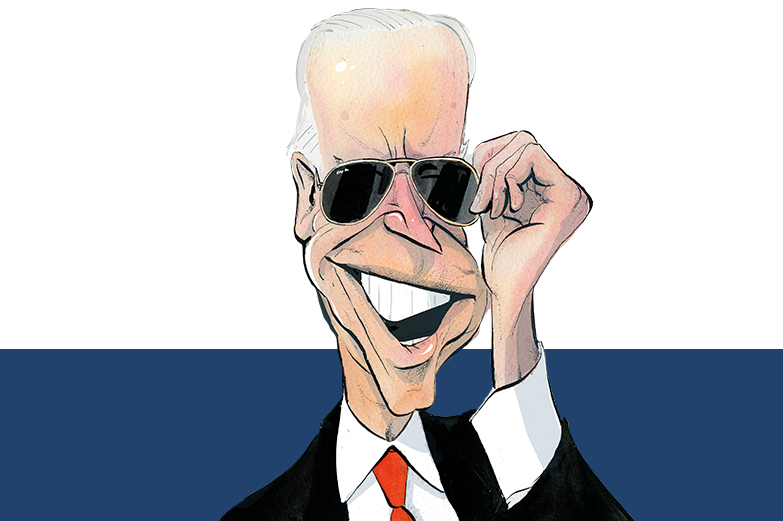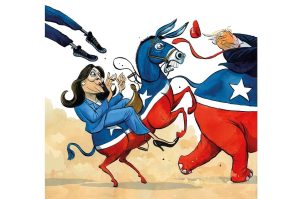Judging by the European press’s reaction to his address to Congress this week, President Joe Biden’s domestic agenda is popular outside of the United States as well.
‘In the choice between going big and going bipartisan, big is winning, remaking America with government at the center,’ the Guardian writes approvingly. Biden embarks on ‘a historic battle against inequality,’ a Le Monde headline announces. ‘America’s democracy can no longer endure the growing gap in income and education, so Biden has to fight for the middle,’ the Süddeutsche Zeitung piles on.
Notwithstanding the President’s unassuming demeanor, there can be no question about the his ambitions. After the sizable COVID-19 relief package, worth $1.9 trillion, and a $2.3 trillion infrastructure bill, the administration is proposing over $1 trillion in new spending and $800 billion in tax credits to make America’s capitalism more palatable to those who see Western European social democracy as an ideal worth aspiring to.
Biden wants to see universal free preschool for all three- and four-year-olds, at a price tag of $200 billion, a nationally mandated 12 weeks of paid parental, family, and sick leave (projected to cost $225 billion over 10 years) and two years of free community college for young adults ($109 billion). He also wants tuition subsidies for low-income students at ‘historically black colleges and universities’, and $45 billion to be spent over the coming decade to combat food insecurity among children.
While Europeans should hope the Biden administration can heal America’s divisions, they should think twice before cheering on his expansive welfare state agenda. In more ways than one, the world benefits from an America that is somewhat rugged and with a relatively austere federal government — as opposed to a scaled-up version of Denmark.
For one, the size of US domestic spending matters to the world. During the Trump years, the US national debt ballooned from $19.9 trillion to nearly $28 trillion. To believe Biden can pay for the new spending by closing loopholes, limiting tax avoidance, and increasing taxes for the wealthy and corporations strains credulity.
And if America’s fiscal situation deteriorates, so will its ability and willingness to honor its foreign policy commitments, notwithstanding the rhetoric of ‘America is back’. The rushed withdrawal from Afghanistan, where a limited and relatively inexpensive military presence has kept the country from falling into the hands of the Taliban might be just a taste of further retrenchment forced by circumstances.
More fundamentally, European commentators who like to look down on the heartlessness of American capitalism — with thin social safety nets, no universal healthcare and high rates of income inequality — forget that the sustainability of Europe’s own welfare states is largely predicated on the existence of a large economy on the technological frontier constantly churning out innovation.
In a famous 2012 study, the economists Daron Acemoglu, James Robinson and Thierry Verdier show that ‘the world equilibrium is asymmetric: some countries will opt for a type of ‘cutthroat capitalism’ that generates greater inequality and more innovation and will become the technology leaders, while others will free-ride on the cutthroat incentives of the leaders and choose a more ‘cuddly’ form of capitalism.
US healthcare, for example, has regularly been the subject of Europeans’ horror and ridicule for its seemingly wasteful nature and unequal access. As a proportion of GDP, the United States spends roughly twice as much on healthcare as the average OECD country. The flip side is that almost half of all new drugs in the world come from the United States. In the current pandemic, it is fairly obvious that — notwithstanding BioNTech’s German location — the main reason why mRNA-based vaccines have been developed, produced quickly at a needed scale, and made available to the world was the fact that the United States was willing to throw extravagant amounts of money on all things healthcare.
It is possible that both the Trump presidency and Biden’s hyperambitious (and until now popular) spending plans — alongside their reserved attitude towards trade — are a signal that significant constituencies in the United States do not want their country to play the role of a global leader and a central provider of innovation to the world (a ‘sucker,’ as the former president would put it. In Acemoglu’s account, the ‘cuddly’ economies are poorer but might enjoy higher overall levels of welfare. Yet if the ‘cutthroat’ economy abandons its role, the ‘cuddly’ safety net-reliant forms of capitalism around the world become far less sustainable.
As a result, the very survival of the ‘European social model’ may well depend on America’s not emulating it and conserving instead its frontier, rough-around-the-edges character. Otherwise, those in Europe who are cheering on Biden’s domestic plans risk being surprised when the President cuts the branch that they are sitting on.
This article was originally published on The Spectator’s UK website.





















